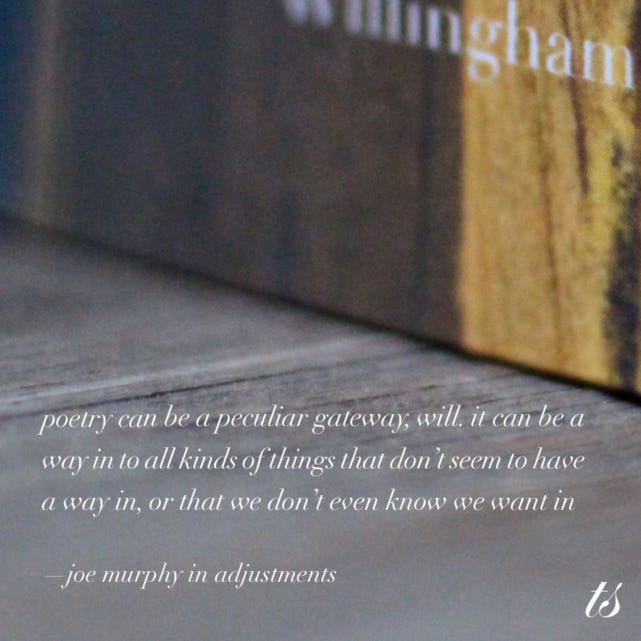We’re sharing Tweetspeak Poetry’s inspiring poemcrazy series,
a book club originally hosted by editor Will Willingham.
Today, you also get to see a special video of poemcrazy’s author!
(video is paid content)
One night recently I awoke to a shout from my son’s bedroom. My house is dominated by teenage boys, so shouting is not unusual, but there was such a commotion I thought it best to get up to check on him. I found him breathing hard and full of all the forceful passion of a man who awakens to a hairy four-legged beast standing on his chest. He insisted forcefully, passionately, that he had indeed been awakened by a hairy, four-legged beast standing on his chest, which he forcefully, passionately threw to the ground.
No such hairy beast was to be found.
By sun-up, he scaled his account back to “a small animal” and admitted he’d been experimenting with lucid dreaming. Since it was not his objective in this self-induced dream state to be confronted by a woolly mammoth standing on his chest, he concluded he might not be doing it right. If I had been better on my toes, I would have suggested he keep a notebook on the bed during these experiments and perhaps he could complete some of his creative writing assignments for English class at the same time.
In poemcrazy, Susan Wooldridge writes of the almost magical space of dreamsense, a “poetic intuition or sixth sense.”
When you start tapping dream consciousness you enter an inner realm where you can explore a terrain almost as real as the outer landscape. We tap into this landscape in meditation, in dreams, and we can dive into it when we write poems. Words sometimes spill out of my daydreams when I’m driving or walking. And I like to write at night or early morning, collecting phrases from near sleep…
She tells of one such incident where she slipped in and out of near sleep, writing alternating lines to a poem that started like this:
I’m a poet in my sleep,
awake I’m dull.
Asleep I seek your mouth
where lips are lounging
like tanned tourists, legs slightly parted.
Awake I play ping pong.
I have a Sunday morning ritual. I make tea–a favorite black that I reserve only for weekends. I read a series of set passages. I prepare a meal. Sometimes I bake bread.
And I write. Longhand. Seven or eight pages. Usually after the tea and before the meal. It is a way of dipping into the unconscious, for me, writing before I’ve had much, if any, conversation. Before my mind becomes too aware of its surroundings.
There is a particular urgency to it. I write everything I can remember, for about an hour, laughing and sometimes crying along the way, though most of it goes by in a blur. Most times when I’m done, I don’t look back at it. I set it away for safekeeping and move on to another pot of tea.
Wooldridge tells of Viking warriors who, according to legend, were expected to be poets.
If a captured Viking could compose and recite a skillful poem to please a rival king, the Viking’s life might be spared. To be slain in battle composing a poem recognizing the valor of your opponent was considered the most honorable way for a Viking to die. [My friend] Rob remembers reading these words in an Icelandic saga, ‘I see your bright sword / is sharp today / home to my heart it comes.’
Poems are needed at times of passage like birth, marriage and death. Like candles and psalms, poems not only help celebrate or clarify, but they can open or ease the way.
A note in pencil in the margin by this passage: “Writing to save your life — or walk it to its end.” You could say, in a way, that I am writing to save my life.
Sometimes, it feels a little frightening — writing without the usual safeguards of fully conscious thought. Wooldridge reassures explaining that we fear poetry in much the same way as we fear the rainforest or the ocean depths — it is unknown, like our own unconscious. But, she reminds us, “what we fear most might be what frees us.”
Poetry and freedom can’t be separated. Poetry takes us places we might never have imagined we would go. Poetry can be incendiary, revolutionary, outside bounds and rules and systems. Poetry is uncontainable, and therefore, dangerous, ignoring the established order.
Poetry may change our idea of who we are, and certainly other people’s ideas of who we are. In the process of writing poems, who we are may actually begin to change.
In the process of writing poems, we might be saving our lives.
* * *
What Happened Next for Will Willingham?
As Will kept traveling down the road of poetry and writing, he eventually took an unexpected turn to fiction—with poetry at its heart. His novel Adjustments is now releasing as a serial story for our paid subscribers here at The Write to Poetry. The story follows some of the themes first raised by Will in the poemcrazy series!
Special Video: Talking with Susan Goldsmith Wooldridge
The following video with author Susan Goldsmith Wooldridge includes Susan’s thoughts on the single most important thing for a writer…
You’ll also get to see Susan’s amazing home office and her wonderful personal journals!
Enjoy this lively video now…







